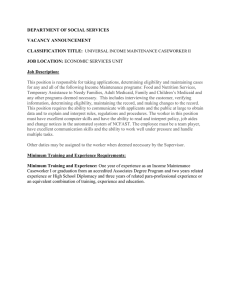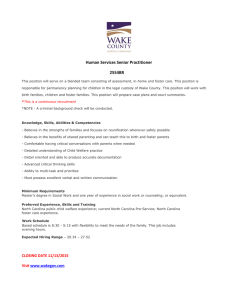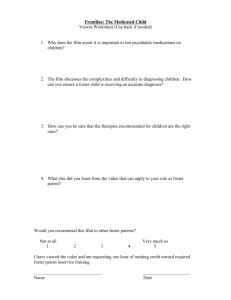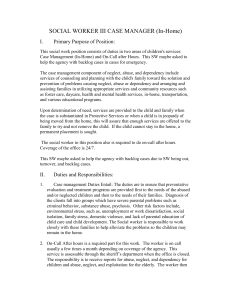299-40-2104
advertisement
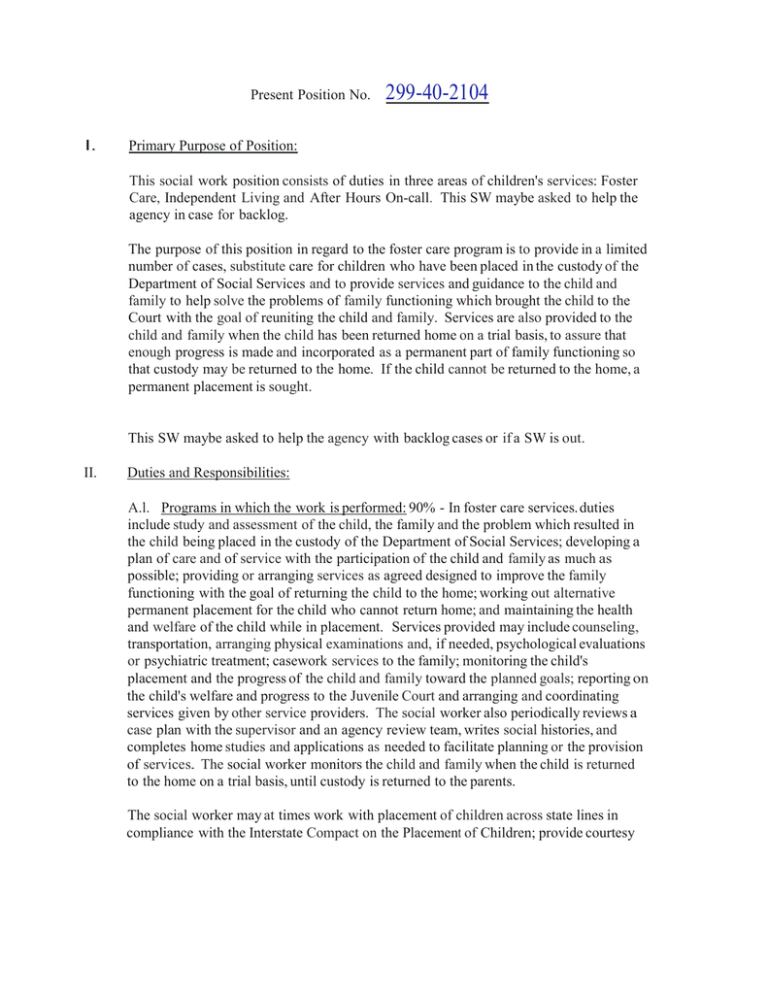
Present Position No. I. 299-40-2104 Primary Purpose of Position: This social work position consists of duties in three areas of children's services: Foster Care, Independent Living and After Hours On-call. This SW maybe asked to help the agency in case for backlog. The purpose of this position in regard to the foster care program is to provide in a limited number of cases, substitute care for children who have been placed in the custody of the Department of Social Services and to provide services and guidance to the child and family to help solve the problems of family functioning which brought the child to the Court with the goal of reuniting the child and family. Services are also provided to the child and family when the child has been returned home on a trial basis, to assure that enough progress is made and incorporated as a permanent part of family functioning so that custody may be returned to the home. If the child cannot be returned to the home, a permanent placement is sought. This SW maybe asked to help the agency with backlog cases or if a SW is out. II. Duties and Responsibilities: A.l. Programs in which the work is performed: 90% - In foster care services. duties include study and assessment of the child, the family and the problem which resulted in the child being placed in the custody of the Department of Social Services; developing a plan of care and of service with the participation of the child and family as much as possible; providing or arranging services as agreed designed to improve the family functioning with the goal of returning the child to the home; working out alternative permanent placement for the child who cannot return home; and maintaining the health and welfare of the child while in placement. Services provided may include counseling, transportation, arranging physical examinations and, if needed, psychological evaluations or psychiatric treatment; casework services to the family; monitoring the child's placement and the progress of the child and family toward the planned goals; reporting on the child's welfare and progress to the Juvenile Court and arranging and coordinating services given by other service providers. The social worker also periodically reviews a case plan with the supervisor and an agency review team, writes social histories, and completes home studies and applications as needed to facilitate planning or the provision of services. The social worker monitors the child and family when the child is returned to the home on a trial basis, until custody is returned to the parents. The social worker may at times work with placement of children across state lines in compliance with the Interstate Compact on the Placement of Children; provide courtesy supervision of a child in the custody of another county Department of Social Services when the child is placed in an approved substitute care arrangement in this county, or complete a home study to assist another county Department of Social Services in planning for a child in its custody. 5% - In the Independent Living, component the social worker keeps up with and arranges for children to learn to be independent and able to care for themselves when they are released from agency's custody. 5% - After Hours On- Call, component the social worker must be on call after hours every other month for a period for one week at a time. They are assessable when the office is closed through the sheriff’s department. 2. Clients Served: The clients served in foster care are non-emancipated children from birth to age 18. They may need substitute care because of abuse, neglect or dependency. In addition, older children often have developed behavioral problems because of the preceding conditions, which must be addressed through counseling, environmental change or referral to other professionals if placements, or return to the home are to be successful. Children served in adoptions are in need of a permanent home, or need to have existing parental relationships legalized as a permanent parentchild relationship. 3. Referral Process: Foster care cases are referred by the Court giving legal custody of the child to the Department of Social Services. These may have been brought to Court by the Department of Social Services Protective Services Unit. Others are brought to the Court by the Juvenile Court Counselor. In the latter case, the Juvenile Court judge has adjudicated the child to be dependent, even though the child may come to Court on the basis of a Petition alleging other conditions. In addition, parents may sign a voluntary agreement with DSS placing the child in a foster care arrangement. B. Major Activities of the Position and Percentage of Time Spent on Each: 30% - Case Management - Arranging and monitoring the flow of services, consulting with others working with the client or with supervisor; case planning, including finding informational sources; writing Reports for the Court, Court and Agency Reviews, and Narratives and multiple forms required by the state. 5% - Information and referral is given to prospective foster parents of adoptive applicants, or to others looking for appropriate resources for child and family concerns. 60% - Provision of services, directly or by arranging, i.e., counseling, health support services, individual and family adjustment services, psychological or psychiatric assessment, arranging appropriate foster care arrangements and monitoring them, completing reports to the court for adoptive applicant and/or child. 2 5% -Resource development; Recruiting and selecting homes, seeking group home or therapeutic placements. 2. Responsibilities in each job function and approximate percentage of time spent on each function: 15% - a. Assessment/Evaluation - is done by the caseworker to provide the basis for case planning. Evaluation by a psychologist or psychiatrist is requested as needed. Information from parents, schools, Health Department, etc. is gathered as needed to organize a social history for the purpose of understanding the child's psychosocial development and the environmental influences. Assessment should lead to an understanding of the services needed, or to obtain understanding of a specific problem. 15% -b. Development/Treatment/Goal Service Plans: Case worker is responsible for understanding the child's or family's needs and helping them to share in this understanding. The service plan is worked out jointly between the caseworker, case team, and family and child, and reflects the ability and willingness of the family to involve themselves, with help, in appropriate planning. The type of goals made by caseworker, child, parents, and prospective adoptive or foster parents might include the following: I. 2. 3. 4. Improved regular school attendance by child. Improvement of parenting skills by parents. Improved skills in conflict resolution on the part of the family. Completion of training programs for prospective foster or adoptive parents. 15% - c. Implementation: Implementation of plans may be done by direct services given by caseworker, or by others whom the caseworker has enlisted, such a the In-Home Aide or others, such as staff in the Health Department, Mental Health Agency, a physician, the Juvenile Court Counselor, family workers in group homes, a psychologist, or by foster parents. In all cases where the caseworker has arranged for others to provide these services, the caseworker consults with the provider and monitors service delivery and the results. 20% - d. Counseling/Therapy: Counseling is done as a part of the casework process. Generally, non-directive techniques are used with parents, whose autonomy is to be supported. Questions can be directed to stimulate client's thinking about their problem. Actions taken and timing by the caseworker are chosen on the basis of knowledge of human behavior and development, and may be supportive, allow ventilation, or present challenges judged to be within the capacity of the client. For therapy of problem behaviors and dysfunctional family relationships, clients are referred to Mental Health personnel, psychologists or psychiatrists. Counseling for this job description may be done with abusive or neglectful parents, or 3 with prospective foster parents and adoptive parents to assess their abilities to parent and to deal with complexities of the children with whom they may come into contact. 20% -e. Monitoring/Reviewing/Maintenance: The worker in this position is responsible for monitoring and reviewing in several areas. Foster Care: Agency and Court reviews must be conducted within 30 days, at 60 days and every six months on the progress of children in foster care toward their permanent goal. Face-to-face monitoring of the child's progress in his placement is done usually monthly at a minimum. 5%- Independent living: Monitoring of this is through need assessment and funding status. The supervisor also monitors the social workers involvement with the adolescents. 5% - f. Consultation: Consultation may be provided to a care provider to help resolve a problem situation with a child. Information the caseworker can provide concerning the child's needs or provision of diagnostic information, in practical form, obtained from mental health professionals, etc... May aid a care provider to utilize a constructive approach with the child. Consultation is provided to parents, foster parents and other care providers, other social workers or the Juvenile Court Counselor or the Guardian Ad- Litem, teachers, etc. Consultation is provided as an aid in planning on the part of others working with the child. 5% - g. Public Relations Work: This worker is involved with prospective adoptive and foster parents and other community personnel. 3. Team Approach: A team approach is employed frequently between the CPS worker and the worker in this job description. Protective Services cases are staffed jointly with the supervisor, and initial home visits are sometimes done jointly. The worker in this position also participates in staffing conferences of foster care cases with the other foster care worker and the supervisor. The agency review team is used to assist with case review and planning. The team members consist of supervisor, caseworker, community representative, and any other persons in community working directly with the child. This team makes regular recommendations, which assist in planning for the client. The caseworker prepares the report prior to the agency meeting, and is responsible for follow up on the team's recommendations. 4. Number of Active Cases: Foster Care Case Management Duties (all routine paperwork, computer tracking forms, agency review notices, filing, etc.): 12 cases. 4

